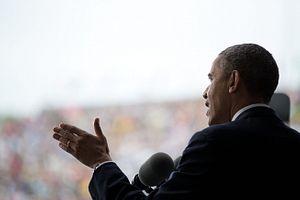On May 28, 2014, U.S. President Barack Obama delivered the commencement address at the U.S. Military Academy at West Point to defend his foreign policy. In the speech, Obama concluded that the source of U.S. leadership rested on four tenants: namely the ability to freely use its military power, a global network of alliances and partners, the ability to build and maintain institutions and the willingness to act in order to maintain human dignity. However, the dilemma the U.S. faces is structural and not easily overcome.
First, wars in Afghanistan and Iraq have exhausted the country and imposed a huge financial burden. There seems little chance either conflict will end in success. Many Americans think the U.S. has failed. According to a poll released by the Pew Research Center on January 30, 2014, 52 percent of respondents believed that the U.S. failed to achieve its goals in the wars in Afghanistan and Iraq.
Second, the U.S. economic recovery has been lackluster. Since the financial crisis of 2008, the U.S. government has turned its focus toward economic revival, but the going has been tough. Though the U.S. economy has grown, it still lacks stamina and stability. For example, according to statistics released by the U.S. Department of Commerce’s Bureau of Economic Analysis on May 29, real GDP shrank by 1 percent in the first quarter of 2014. Meanwhile, the unemployment rate has remained above historical norms. Although the figure has declined in recent months (for example, to 6.3 percent in April 2014, a new low), the recent economic contraction does not suggest further progress is likely. Because many economic and social problems have not been effectively addressed, the American public is less inclined to support U.S. engagement overseas. According to a poll conducted by Pew Research Center in October and November 2013, for the first time since 1964, more than half of respondents (52 percent) believed that the U.S. should be concerned with its own affairs. In addition, 80 percent of respondents agreed with the statement, “We should not think so much in international terms but concentrate more on our own national problems and building up our strength and prosperity here at home.”
Third, the U.S. political system is inefficient. The U.S. founders considered the core of the U.S. political system to be fairness, equity, and the rule of law, even at the expense of efficiency. However, they would not have expected there to be so little progress in fairness after more than 230 years of development. Witness the Occupy Wall Street movement against “the 1 percent” in 2011. Meanwhile, the political system has become increasingly inefficient in recent years. Washington is in gridlock, and the American people have lost confidence and patience in both main parties.
Fourth, the rise of other countries has made the U.S. anxious. In a globalized era, international relations are that much more complex. Countries that fail to seize opportunities and minimize strategic errors can find themselves eclipsed, eve if they have an early advantage. It should be noted that it is not just one or two countries on the rise right now, but a group of countries around the world. As the leading power, the U.S. not only feels threatened, but more importantly that threat is psychological. Of course, no one country can surpass the U.S. in the short term. Still, this trend of diminishing strength relative to its rivals is likely to make the U.S. uncomfortable, mainly because the U.S. regards leadership as one of its core interests. In his West Point speech, Obama emphasized that “America must always lead on the world stage.”
This inertial thinking of “American leadership” dominates Obama’s international vision and strategic planning. This is partly because the U.S. has been an international leader for decades, solidifying its “leadership” self-identity, and partly because of a firm belief in American exceptionalism. Obama himself has stated that he believes in American exceptionalism with every fiber of his being. However, time changes things significantly. If the U.S. continues to hold onto this view of itself and the world today, it will inevitably be frustrated. In his speech, Obama pointed out that now the real question is not “whether America will lead, but how we will lead.” He did not answer his own question. Perhaps he did not know. Fundamentally, then, Obama’s strategic dilemma lies in the contradiction between the unwavering intention of the U.S. to lead globally, and its declining ability to do so.
Chen Jimin, Ph.D is an Assistant Research Fellow for the Institute for International and Strategic Studies at the Party School of the Central Committee of C.P.C. The views presented here are the author’s own.

































